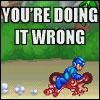Leaderboard
Popular Content
Showing content with the highest reputation on 01/26/2016 in all areas
-
Failure is not writing "bad music". Failure is not writing music at all. If you don't like something, just remember its music, music is subjective. and someone somewhere will adore it. Being a composer means writing things you won't necessarily enjoy or like... hell you might not see any merit in it at all. Having a career as a composer is about keeping someone else happy, not yourself. Sometimes that means writing something in your own style, but usually you gotta fit to your brief. Besides, sometimes a mediocre idea can turn into something incredible if you just keep at it. Never give up, never scrap an idea if you can help it. You never know what you'll end up with, or what may happen.2 points
-

MAGFest 2016 (Combat your Post-MAG Depression here)
VinnyMac reacted to DarkeSword for a topic
Hey everyone. Figured I'd get this discussion rolling now. So during Magfest I know that everyone likes to coordinate when we go out and get food, when we're gonna hit concerts, and other general hanging out. In the past we've used GroupMe, a mobile messaging app, to coordinate. Other options are Hangouts and Facebook Messenger. I personally would ask that nobody include me in group MMS and SMS texting (it costs me money on my phone if you're not an iPhone user). The "OverClocked ReMix" group still exists on GroupMe, but I'd like to propose we make a couple of chatrooms for coordinating. One for food meetups ("anyone getting lunch? where are you guys going? what time?"), one for concerts and panels, and one for general hangout/magchat stuff. What do you guys think? I've renamed the OCR group to OC ReMix @ MAGFest 20161 point -

Michael Jackson confirmed as a composer for Sonic 3 (2016 UPDATE)
OceansAndrew reacted to Arrow for a topic
I was participating in Sonic the Hedgehog role play sessions on AOL back in 1995. Step back son.1 point -

Michael Jackson confirmed as a composer for Sonic 3 (2016 UPDATE)
classic_gamer_76 reacted to Garpocalypse for a topic
You sir, have crossed the line. In all seriousness though i'm hijacking this thread to discuss OCR's obvious Pro Nintendo-Anti Sega Agenda. ..and GO! ...ok i'll start. No OCR Genesis controller logo? what is that?! They should at least be interchangeable!1 point -

Michael Jackson confirmed as a composer for Sonic 3 (2016 UPDATE)
Garpocalypse reacted to OceansAndrew for a topic
You don't know that because you were never hardcore enough to be a Blue, scrub.1 point -

Michael Jackson confirmed as a composer for Sonic 3 (2016 UPDATE)
Garpocalypse reacted to lazygecko for a topic
He already had a years long relationship with Sega at that point (1990 Moonwalker game), and there are anecdotes from people like Spencer Nielsen about his visits to their US development studios at the time. A TecToy official (Sega's Brazilian partner for manufacturing and distributing their hardware/games) also recently said that Jackson had approached Nintendo first to pitch his Moonwalker game, but they turned him down so he went to Sega instead. This hasn't been officially confirmed either. Once you analyze the music it's fairly easy to mark down the tracks pinned on the Jackson team. Knuckles' theme, miniboss music, Carnival Night, Ice Cap, Launch Base and the credits music. Tonally they are distinguished from the rest of the soundtrack in that they are less overtly melodic and fit with the kind of sound they had for the Dangerous album at the time. They are also heavily based on PCM samples, and they rely more on special samples unique to each track (compared to the rest of the soundtrack which just uses a standard shared drumkit for samples). The article also brings up that the main issue they had with realizing their vision was that they had to compromise too much on sample usage due to the memory and cartridge space limitations, since PCM inherently eats up a lot of that at an era where these things were a very precious and expensive commodity. The kind of approach they had to the music was just very unorthodox for the time (not samples in themselves, but rather amassing unique sets for each individual song which really balloons the file size), but since came from the outside with no experience working with console limitations you can't expect them to know that.1 point -

How do you get over fear of failure?
timaeus222 reacted to Tex for a topic
It's when I listen to earlier works from my favorite artists. And when they admit their first attempts were crap.1 point -

Michael Jackson confirmed as a composer for Sonic 3 (2016 UPDATE)
Flexstyle reacted to Nabeel Ansari for a topic
That's just because I have a BlackWidow.1 point -
At first I read that as "agreed 10%" and I couldn't help think how non-committal that sounded.1 point
-
"AND IN TODAYS NEWS - Michael Jackson is still confirmed as a composer for Sonic 3."1 point
-
1 point
-
This is pure opinion, based off of observations. So keep that in mind as you prep your flamethrowers... Metal and Rock are still doing just fine... outside of America. It's thriving with bands like Powerwolf, Orden Ogan, Accept, Edguy, Nightwish, and the many other bands that fall under various "power," "thrash," "symphonic," etc. monikers from other countries. The problem is, that in America, unless a given foreign band has been around for a good while, or comes to the U.S. a lot, many of those bands don't have the name recognition to carry them around in the U.S. and garner them attention (outside of labels like Napalm Records at least). Sure, there are bands like Iron Maiden, AD/DC and Accept that get noticed when they come to the U.S., but they don't really draw in droves of new fans. Instead, they get by mostly with those who have been listening to them for years (or decades). Now granted, we 'muricans have a few of our own Rock and Metal bands. Metallica, KISS, Megadeth, Van Halen, Anthrax, Rob Zombie, Alice Cooper and others who do well when they tour. But they're familiar names that draw in the same fans again and again, while slowly pulling in new ones. And though it may not seem like it, these bands are still inspiring people to join the Rock 'N Roll fray. YouTube's copious amount of young electric guitar players shows that the idea of being a rocker is still out there, but you have to remember that the term "rock star" isn't just about playing Rock or Metal. It's the idea of being on stage, in front of thousands of people that are watching you perform, hearing you sing/speak, and getting whatever message you're putting forth. And while there are new faces coming into the world of Rock and Metal, more faces seem to be headed into other genres to find that "rock star" life. There has to be a reason for this, right? A cause of some kind that's making certain genres more attractive to young musicians. Well, think about it. We live in a world of "I want it NOW!" People expect instant results, and want to put in as little effort as they can get away with. With that in mind, here's a quick question. What genres generally require you to be able to play an instrument? Country, Rock/Metal, Classical, Folk, and their ilk that involves guitars, drums, pianos, violins, flutes, various brass instruments, etc. What genres generally don't require this? Pop, Rap, the various slices of Electronica, etc., as what you write musically can be done electronically. It's become pretty easy to write out a few beats on a DAW, put some lyrics to them (or just go instrumental), and then put it out there. Yes, you still need a sense of timing, rhythm, rhyming, harmonies and so forth, but you don't have to know how to play a real-life keyboard, guitar, violin, drum set, or anything to create a complete song in that second group of genres. The sheer number of programs that are out there nowadays that allow this to be done is insane. As a result, that second group of genres I listed leave the proverbial door open more, so you've got more people trying to step through that door instead of trying to invest the time in learning to play an instrument that you have to hold and touch. I know what you're thinking, and yes, I know that sounds a touch mean and simplistic. But it's also the generalized truth. I'm a living example of it. I can't play any physical instrument to a degree that I'd be able to perform live on a stage, but that doesn't mean I don't have ideas, or the ability to look up what the limitations are on a given instrument so I can represent it more realistically. My remixes over the years show this growth, and my upcoming album will as well. I can't play live, but I can do research and compose, and that's where genres like Rap, Pop, R&B, Electronica and them are more open to people like me. Hell, piano and classical music (my main areas) are fast approaching the same openness now thanks to very realistic VSTs and sample sets, but they still have expected limits that need to be taken into consideration in terms of what the real instrument can and can't do. Pop, Rap, Electronica and them don't have that caveat. Is this a good thing? I don't know, to be honest. It could result in a huge flood of mediocrity and shit, with droves of forgettable, horrid albums and songs. But then again, being able to play an instrument live never stopped that from happening, did it? Lots of other bands came and went over the last 50 years alone that no one knows about, or even remembers these days (assuming anyone did back then). So yeah. To me, the "rock star" isn't going extinct, it's changing because the music industry, and what it takes to make music, is changing. We still have people wanting the so-called rock star life, but "rock star" isn't about Rock or Metal. Never was. It was just a term to attach to the idea of commanding an audience and getting lots of cash, which can be done in pretty much all genres. Elton John did it, so did Liberace, Kenny Rogers, The Pointer Sisters, and many others. But the older genres of Rock, Country, Classical, and those genres have steep learning curves that extend over many years thanks to their greater need to learn to play real instruments, where as Rap, Pop, R&B, Electronica and them have less intimidating learning curves that make people think it can be conquered in less time. So, given the "I want it NOW!" mentality and short attention spans that exist in the world today, more new artists are going that second group of genres. Some will make it because they have a real talent in them despite the lack of live playing skills, and others will fade away without being noticed because they're as generic and uninteresting as can be. Hopefully, I wont fall into the latter group Edit: Smoothed out a few thoughts.1 point
-

Mega Man: The Wily Castle Remix Gauntlet 2013
DjjD reacted to DarkeSword for a topic
God Bless America. Anyway, I want to discuss another thing I'm seeing with novice mixers. A bit of a disclaimer: I'm going to talk now about my own approach to arrangement, and hopefully that will help you. I know that a lot of people can approach arrangement in their own way, and that's fine, but I want to talk about this because I want people to use these competitions as a learning experience. On with the show. Sometimes when I listen to entries from newbies, there's a sparseness there that really hurts the track. The issue ends up being that what I think of as the four basic elements of a song aren't present. Years ago I wrote an essay called "The Four Man Combo Approach to Arrangement" which explained how to make a full arrangement using the analogy of a four-man jazz combo. Because that analogy is not particularly relevant to everyone here, I'll paraphrase and be a bit more general. Generally speaking, there are four basic elements to a song: lead, accompaniment, bassline, percussion. When you have these four elements represented, you can achieve a basic fullness in your arrangement. Not coincidentally, basic NES music (like Mega Man songs!) follows this pattern. You've got your two pulse waves (lead and accompaniment), triangle (usually bass), and the noise and sample channels (usually percussion). The lead is obviously the melody; it's what everything else is built around. It generally sits in the middle or upper register. The bassline works with the percussion to establish the rhythmic "feel," but also lays down a foundation for the chords and harmonics structure of the piece; it generally sits in the lower register (i.e. bass). The percussion is there to establish the tempo and the general rhythmic "feel" of the track. You can do this without percussion, but more often than not this is the easiest way to do it. I'm talking about accompaniment separately because I feel like this is the one that people often overlook when starting out. Accompaniment can be a lot of things: sustained chords, syncopated chords, arpeggios, etc. The important thing about the accompaniment is that through the chords (and in tandem with the bassline), it gives the melody context. Accompaniment helps to establish the harmonic feel of your song; it lays out your chord progression and establishes key and tonality. These are really important things, especially when arranging melodic music like you find in Mega Man games. Now, when I talk about having the four basic elements of arrangement, I'm not telling you that you should only have four instruments in your track. You can have as many instruments as you want, but generally speaking, all of those instruments are going to fit into the specific roles. You'll have a couple of lead instruments trading on the melody or playing counter-melodies and embellishments, you'll have some strings or piano or brass or synths laying down your chords as accompaniment, and then you've got your bassline providing a solid foundation for everything to sit on, and then your percussion tracks set up the groove. So I want you newer guys to think about this when you're writing your track. Are you establishing the chords and using accompaniment effectively? Is your melody clear or is it fighting with the bassline because it's just too damn low? Did you forget about bassline and accompaniment altogether? Play your song back for your teammates and ask them if they can pick out the four elements. Hopefully you guys will take this to heart and we can start hearing some fuller, more balanced arrangements. Happy mixing.1 point




